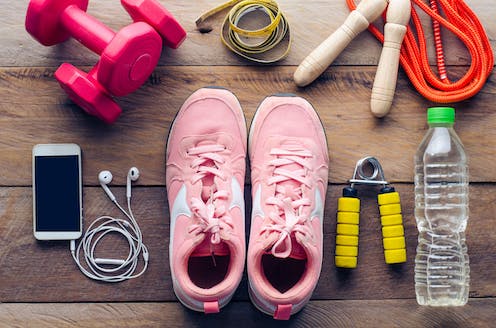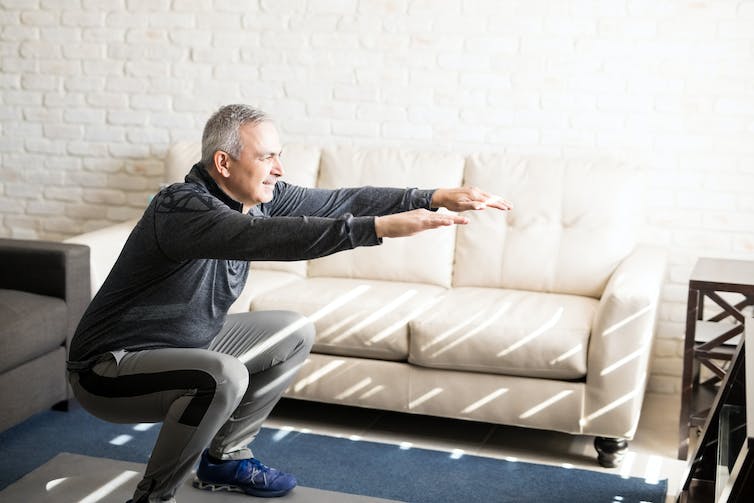
Most of us know we need to exercise more. Yet finding the time to work out is often easier said than done. For most, the only time we have to exercise is on the weekends.
The good news is that so-called “weekend warriors” (people who only work out two days a week) can still appreciate the health benefits that come from regular exercise, even if their workouts are only crammed in on the weekend. But it’s important to make sure you’re doing the right type of exercises to get the most benefits from these training sessions.
Cardio or resistance exercise?
There are two main types of exercise everyone should aim to do.
The first is cardio, which of course refers to aerobic exercises – such as walking, jogging or cycling. Cardio is great for preventing and even treating a number of chronic health conditions, such as hypertension, type 2 diabetes and cardiovascular disease.
The second is resistance exercise, which involves any activity where the body or a particular muscle group is required to act against an external force – such as weightlifting or pilates. Resistance exercise is good for bone health, and can improve muscle strength, size or endurance. It also slows the rate of bone and muscle loss during ageing. Resistance exercise can also be great for controlling body weight, blood pressure and type 2 diabetes.
Since both of these types of exercise have different benefits, it’s important to do a combination of both for good health and fitness. But with only so much time on the weekend, the idea of squeezing both in can seem a bit daunting.
For cardio exercise, HIIT (high-intensity interval training) is particularly well suited to weekend warrior exercisers. HIIT produces similar benefits to cardiovascular health as a 30-minute jog – but in a much shorter time. Studies have shown doing four to seven bouts of intense exercise for one minute, followed by 60-75 seconds of rest, can improve fitness and wellbeing. So in theory, as little as eight minutes of HIIT could be beneficial to your cardiovascular health.
But to get the most benefit out of your session, it’s important to perform your HIIT alongside resistance exercise.
There are a two main types of resistance exercises. The first type are multi-joint exercises (such as squats or a bench press), which are effective for increasing strength. Single-joint exercises (such as a bicep curl) are more effective when trying to increase the size of a particular muscle group.
The exercises you do will largely depend on your goals. If fat loss is your aim, then multi-joint exercises may be best as they burn more calories because they use more muscles.

antoniodiaz/Shutterstock
Similarly, exercise order is important. If increasing muscle size is your goal, then performing single-joint exercises prior to multi-joint exercises which use similar muscle groups could hamper your progress. If you want to build strength, the order of your exercises does not seem to matter.
For general health and fitness, combining upper and lower body exercises targeting the major muscle groups (chest, shoulders, back, hips, legs, arms and core) is best. For each muscle group, aim to do eight to 12 repetitions of an exercise for between one and three sets, resting for two to three minutes between sets and exercises. You should aim to be lifting a weight that is challenging (but not too challenging) for the target repetition range.
If you want to save even more time in the gym, try “supersets”. Perform a chosen exercise for eight to 12 repetitions, then go straight into your second exercise. Rest for one to two minutes after, before repeating for your remaining sets. This method works best when the two exercises target different muscle groups.
Read more:
Supersets save time in the gym – which may help you reach fitness goals faster
Designing your workout
How you structure your weekend workouts will largely come down to your preference, your goals and how much time you have. Regardless of what you do, make sure to include a good dynamic warm-up to avoid injury.
If your focus is to improve or maintain your general health and fitness, then mix it up. You might want to include HIIT training for cardio followed by a mixture of resistance exercises focusing on the upper body on your first day. The next day you may wish to begin with some low-impact continuous cardio (such as a bike ride) followed by some lower body resistance exercises. Each week try to introduce some new exercises or swap the exercises each week – such as using different variations of a squat (such as barbell squats one week then sumo squats the next).
If you find it hard to fit everything into one session then spread it out over the day. Try going for a walk, jog or bike ride in the morning then focus on resistance exercises later in the day. It’s important to find something that works for you and fits in with your lifestyle in order to make these workouts become a lifelong habit.
For losing fat, HIIT has been suggested as the magic bullet. But remember that increasing your muscle mass leads to a higher resting metabolic rate, meaning you burn more calories at rest. So be sure to include large multi-joint exercises which target more muscle, such as the squat or bench press to enhance fat loss.
Of course, the more exercise you can squeeze in throughout your week, the more health benefits you’re likely to see. Just make sure that when you do your workouts, you only do as much as your body can handle to avoid injuries – and make sure you warm up sufficiently.
![]()
The authors do not work for, consult, own shares in or receive funding from any company or organization that would benefit from this article, and have disclosed no relevant affiliations beyond their academic appointment.
























